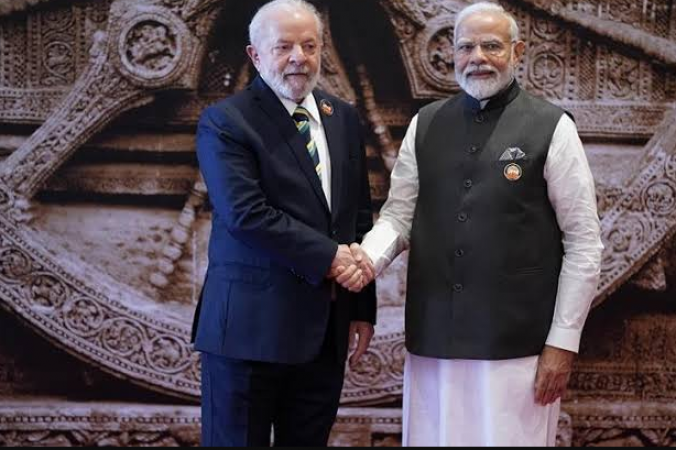
Rio De generio: In a significant and potentially controversial statement, Brazilian President Luiz Inacio Lula da Silva has declared that Russian President Vladimir Putin will not face arrest in Brazil should he attend the Group of 20 (G20) meeting scheduled for Rio de Janeiro next year. This announcement has generated mixed reactions both domestically and internationally and carries substantial legal, diplomatic, and political implications.
To contextualize this development, it is essential to acknowledge the ongoing Russia-Ukraine conflict. Vladimir Putin has faced accusations of war crimes in Ukraine, and calls for his arrest and trial have echoed worldwide. This backdrop sets the stage for the controversy surrounding Putin's potential visit to Brazil.
In an interview with Folha de S.Paulo, President Lula reaffirmed Brazil's commitment to the principles of diplomatic immunity. He stated unequivocally that Brazil, as a "democratic country," would not violate this fundamental principle by arresting President Putin. "We are a country of law," Lula emphasized, "We cannot violate the principle of diplomatic immunity."
Also Read: From Nataraja Statue to Konark Chakra, These Highlights Captivated the World at G20
This assertion by Lula aligns with international norms that protect foreign leaders from arrest and prosecution while on official visits. These norms exist to maintain diplomatic relations, facilitate international dialogue, and prevent diplomatic crises. Lula's statement reflects Brazil's commitment to upholding these conventions, irrespective of the controversy surrounding Putin's actions in Ukraine.
Lula's declaration has elicited a range of responses from various quarters. Some have commended the Brazilian president for prioritizing the sanctity of diplomatic immunity, arguing that it demonstrates Brazil's commitment to international norms and the rule of law.
On the other hand, critics have accused Lula of taking a soft stance on Putin, given the allegations of war crimes. They argue that Brazil's decision not to pursue Putin's arrest might be perceived as compromising on human rights and justice in favor of diplomatic relations.
From a legal perspective, Lula's statement reinforces the established norms of diplomatic immunity. Putin, like other foreign leaders, would likely be protected from arrest and prosecution while attending the G20 meeting in Brazil. Violating this principle could potentially lead to diplomatic tensions and disputes that could have far-reaching consequences for Brazil's international standing.
Also Read: Google Pixel Watch 2 to Launch in India on October 5th, Teaser Confirms
Diplomatically, Lula's statement introduces an interesting dynamic. Brazil, a vocal critic of Russia's invasion of Ukraine, is now positioned in a delicate balancing act between its Western allies and Russia. While Lula's emphasis on diplomatic immunity is consistent with international norms, it could be interpreted as an attempt to appease Russia, which might strain Brazil's relations with Western countries.
The ultimate question remains whether Vladimir Putin will indeed attend the G20 meeting in Rio de Janeiro. If he chooses to participate, it is improbable that he would face arrest in Brazil due to diplomatic immunity conventions. Nonetheless, his presence at the gathering is almost certain to provoke controversy and scrutiny.
Beyond the legal and diplomatic aspects, Lula's statement carries political ramifications. By publicly asserting Brazil's commitment to diplomatic immunity, Lula may be attempting to navigate the complex geopolitics surrounding the Russia-Ukraine conflict. This move could help mitigate potential strains on Brazil's relations with Russia, which holds strategic importance in the global arena.
However, it also raises questions about Brazil's alignment with Western democracies and its stance on human rights and international justice. Critics argue that prioritizing diplomatic relations over holding alleged war criminals accountable may undermine Brazil's credibility as a defender of human rights and the rule of law.
President Lula's announcement that Brazil will not arrest Vladimir Putin should he attend the G20 meeting in Rio de Janeiro highlights the intricate interplay between diplomatic norms, international relations, and domestic politics. It underscores the importance of diplomatic immunity in preserving international stability while fueling debates about the moral and ethical dimensions of such immunity in cases involving alleged war crimes.
Also Read: Former SA Star AB de Villiers Highlights India's Home Pressure Ahead of ODI World Cup 2023
As the world continues to watch developments in the Russia-Ukraine conflict, the stance of individual nations like Brazil will be closely scrutinized for their alignment with global values of justice and human rights. Lula's statement reflects Brazil's commitment to diplomatic conventions but also raises questions about its geopolitical positioning in a complex and evolving international landscape. The ultimate impact of this statement on Brazil's relations with Russia and its Western allies remains to be seen, making it a significant development in the ongoing saga of the Russia-Ukraine war.